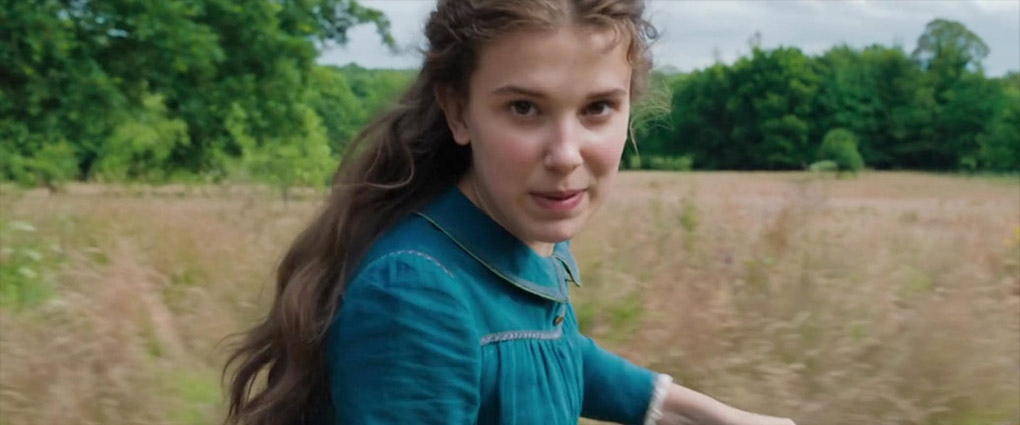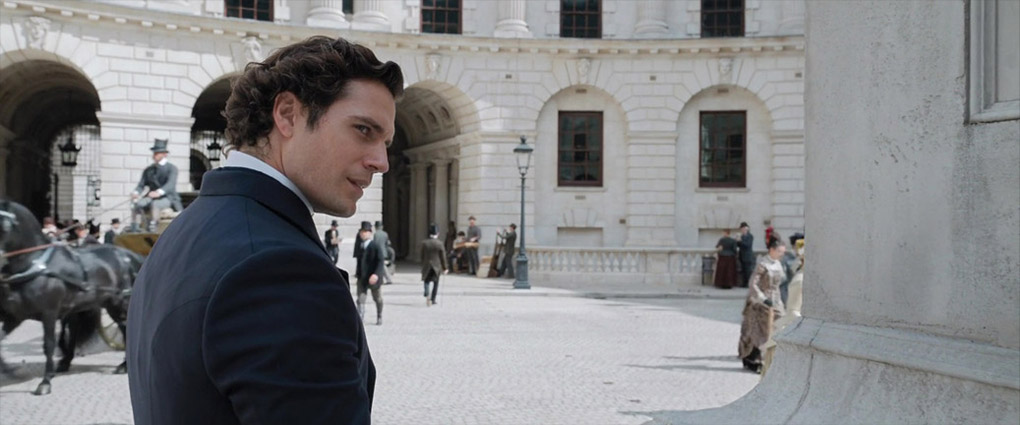| |
'Growing up in the public eye, however, hasn’t been easy. “Being a young person, it can be hard to be taken seriously,” she says. “It’s so important that we recognise that the work- space isn’t an equal playing field.” She cites philanthropic stars like Angelina Jolie and Leonardo DiCaprio as role models, and is proud that her generation is mixing things up. “Young people are doing great things…”' |
| |
Producer/actor Millie Bobby Brown interview in Grazia magazine* |
There are very few cultural benchmarks (like top quality manure meant with respect) that have sprouted such magnificent fruit but the name ‘Sherlock Holmes’ is certainly one of them. And there is only one human being on this planet - that I am aware of - producing multi-million dollar movies at fifteen years of age. Let that sink in… Mille Bobby Brown (now mercifully sixteen) is also the youngest UNICEF Goodwill Ambassador, a multi-award winning English actress, and according to Time magazine in 2018, one of the one hundred most influential people in the world. Needless to say, companies are lying prostrate at her feet hoping she chooses to endorse their products over a rival’s. But if all this seems surprising – and I admit, I snorted with some condescension when I read she was actually producing Enola Holmes - I have been, like the rest of the world, utterly beguiled by this girl who gives profound levels of extra meaning to the word ‘precocious’ and none of its attached negativity. Millie Bobby Brown and US author Nancy Springer’s Enola Holmes Mysteries are a fine fit though Conan Doyle purists, feel free to disagree. Ever since the great consulting detective’s principal canon drifted out of copyright and into the public domain, film and TV makers have leapt upon the chance to profit from one of the best-known global brands. Of course the outpourings of Holmesian drama has had its shining stars and its misfires. After all, the character holds the record for being the most portrayed on screen. I had a fleeting fascination with author Laurie R. King’s Mary Russell series of novels set during the detective’s autumn, bee-keeping years and while not too enamoured with Guy Ritchie’s cinematic incarnation, I was taken with the visual invention of Benedict Cumberbatch’s Sherlock though felt the final series might have vaulted too high over the bar of believability. But I remain a huge fan of the 80s’ Granada series with the incomparable Jeremy Brett as Holmes and of course, the original Conan Doyle stories still shine so brightly to me after I first discovered them in the spare room of an American friend’s house. I read every story over a week while convalescing from a viral infection in the late 80s. My volumes are well and repeatedly thumbed.

So it’s 2020. Still. Miserable, isn’t it? What novel hoops is the Holmes character required to jump through in this latest iteration? Over the past century, the great man’s life and family have expanded well beyond Baker Street. In an attempt at originality and spice he’s been given relatives including a little sister who’s a chip off the Holmes’ Stock. The final series of Sherlock hinged upon such a character but then Eurus, far and above her brothers in mental ability, was judged insane. Enola Holmes takes a leaf out of the Fleabag conceit of having its lead character have a direct relationship with the viewer. Both share the director Harry Bradbeer so this cannot be coincidental. To be fair, Phoebe Waller-Bridge ‘borrowed’ the fourth wall breaking intimacy with the audience from the original BBC’s 1990 House of Cards with Ian Richardson using the viewer as his ipso facto confidant. But does it work here? Millie Bobby Brown is so assured as Enola and those piece-to-camera moments are sparse but expertly distributed. In preparing to leave her house undetected, she gathers up Sherlock’s old clothes to disguise herself while addressing the camera. In a split second, she drops a boot, reacts in character to an obviously unscripted mistake and it’s a lovely moment wisely preserved in the final cut. There is another shot later in the film when shotgun shells are dropped on to a marble floor and one of them upends itself, a rare occurrence without digital intervention and I have to believe it was just serendipity. Brown’s confidence and playfulness in the role allow for this potentially arch and pretentious style to appear to be off the cuff and dare I say charming. So, two stories are played out. Enola’s mother, the idiosyncratic feminist risk-taker Eudoria played by Helena Bonham-Carter, clearly relishing the part if not the corsets and bustled dresses, has trained her daughter in self-reliance, martial arts and cryptography. When she suddenly goes missing for the sake of her daughter’s safety, Enola takes on the case of the missing mother while visited by her older brothers, Sherlock (Henry Cavill) and Mycroft (Sam Claflin). Along the way, as she boards a train heading for London, she comes across a young man hidden in a carpet bag who turns out to be the missing Viscount Tewkesbury (Louis Partridge channeling his inner Timothée Chalamet). And he is being hunted by a murderer intent on getting his job done played by Burn Gorman of Torchwood fame. In a small role, in one of the most effective scenes in the film and one of the only ones without its star, is Susie Wokoma as Edith. In three sentences she sums up white male privilege in such a way that shames Sherlock and it’s a scene that’s already made its way to Twitter and so it should. It’s writer Jack Thorne’s nod to the need for diversity and done so well in the context of a simple but effective tale of female empowerment at the turn of the nineteenth century, that it’s almost shocking. Bravo, Jack. Anachronisms in dialogue have rarely been so welcome nor so well timed.
There is a satisfying if more physical than cerebral dénouement but the success of the venture sits on the shoulders of its young star and the phrase ‘flash in the pan’ cannot possibly be applied to Brown. While not critic-proof (who is?) her performance as Enola is always greatly and effortlessly entertaining. While she has enjoyed a blessed career still in her teens, her promise and potential for whatever futures our idiotic world leaders are blindly mapping out for us are mind-boggling. It is very difficult to think of this talented young girl as a competent and able producer and I have no clue if the idea was tabled as a marketing ploy or if this extraordinary girl genuinely co-handled the reins of a giant production. I have faith that she knows what she was doing even if it was just soaking up all the producing experience she was teamed with; three producer credit cards list (a) three PGA members (Producers Guild of America), (b) Millie and Paige Brown (Millie’s older actress sister mysteriously credited on the IMdb film credits as simply ‘Paige’). In (c) we have three Executive Producers, one being the film’s director (having both Fleabag and Killing Eve under his directorial belt), Harry Bradbeer. Bradbeer’s talent with his cast is evident. The only cast member who seems squeezed into a role a little less comfortably is Henry Cavill as Holmes himself. Holmes has always been a wiry fellow in my imagination (and in Sidney Paget’s original drawings) and while a more than credible, bulked up Man of Steel, Cavill seems attired in suits just a little too tight for a fitting Sherlock Holmes. This isn’t to denigrate his actual performance, one which is nicely judged but sometimes getting a ‘name’ in your movie might lead to compromised casting. It’s nothing like casting Arnold Schwarzenegger as heroin-addled Renton in Trainspotting but that thought did cross my mind.

The film looks exquisite showing England’s countryside off in a fetching manner but once visual effects are brought in to convince us of late nineteenth century London, there is a clear separation from what is and what isn’t real. Perhaps this was the intention lending a dreamlike air (or even smoke) to the proceedings? Or was it just a lack of resources? In the early train sequence, there are shots that scream digital enhancement (impossible camera moves, performer safety etc.) but they seem more in keeping than the less dynamic wide shots of London. The effects don’t rob the film of any of its abundant charms but they do pull you out of the film a few times. The phrase “Oh, that’s a nice effect!” while watching has to mean precisely the opposite. Editor Adam Bosman’s style is pleasingly invisible even in the jump cuts. While these do shift things along at a pace commensurate with Enola’s informative, snappy voice over, their inevitable mismatching very infrequently calls attention to itself. Again, most jump cuts work seamlessly but there are a couple of times where I wondered if things could’ve been a little smoother (but again, perhaps that wasn’t the point). To his or the sound editor’s or mixer’s credit is a moment of sublime aural perfection. The audio mix from a Mycroft cry of “Sherlock!” to a steam train engine and whistle is even better than a mother’s scream to an underground train at the start of Spielberg’s woeful sequel to Jurassic Park.
Enola Holmes is undemanding fare, gently world-building, a film that won’t change our own but it may convince you that fifteen and sixteen year olds can possess extraordinary talent when given the resources and opportunities to shine.
* https://graziadaily.co.uk/celebrity/news/millie-bobbie-brown-interview/
|